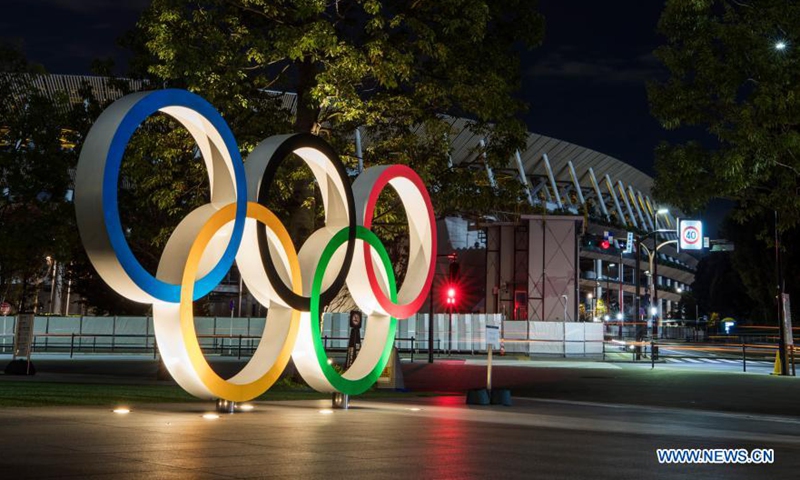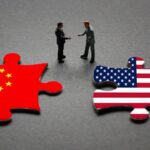Photo taken on Nov. 10, 2020 shows the illuminated Olympic rings and the new National Stadium, the main venue for Tokyo Olympics and Paralympics, in Tokyo, Japan. Tokyo is the capital and most populous prefecture of Japan. As you might expect from one of the world’s most bustling cities, Tokyo is phenomenally vibrant at night. (Xinhua/Du Xiaoyi)
By Sun Haoran
The Japanese government recently planned to exclude overseas spectators from attending the Tokyo Olympics and Paralympics in summer 2021, and Chinese ticket buyers said that they were hesitating on whether to go and watch the events because of the COVID-19 pandemic, starting to lose interest due to uncertainty if the games can be successfully held.
According to Kyodo News, the Japanese government made this plan as part of their efforts to prevent the spread of the novel coronavirus.
The government and the Japanese organizing committee of the Summer Games are expected to hold an online meeting with the International Olympic Committee and two other bodies possibly next week to make a formal decision on the issue of overseas visitors, said the report.
Kyodo News said that while about 1 million overseas spectators were estimated to enter Japan, some 4.45 million tickets have already been sold in the country, of which about 810,000 requests for refunds have been made so far.
According to Caissa, a Beijing-based tourism company which is the only agency to buy tickets for the Tokyo Olympics in the Chinese mainland, people from China can still buy tickets from them and there has been no cancellation notice issued from the Japanese Olympic Committee regarding the trip to Japan for Chinese ticket buyers so far.
“I bought a ticket online in summer 2019 for a men’s basketball tournament to be held at the Tokyo Olympics with fierce competition as many people were eager to get one ticket,” Zhang Zhiling, a Chinese ticket buyer, told the Global Times on Thursday.
“I disagree with the Japanese government’s plan as the Olympics, which are held once every four years, are one of the biggest events in the world. The biggest charm of the games is that it can gather people from all over the world together, no matter what your ethnic, cultural or political backgrounds are,” Zhang said. “It’s a party for all of us.”
The Japanese government can make better plans as there are effective ways, such as strict health screening and vaccinations before boarding, to contain COVID-19 from spreading in Japan during the event, Zhang added. “It [the plan] will definitely extinguish my passion. If there are no overseas spectators attending the games, it’s not Olympics anymore.”
“I thought I was lucky and had high hopes for the games, but now my enthusiasm is kind of fading away as negative news about the event keeps coming,” she said. “I am considering whether I should actually get my money back by applying for a refund because of COVID-19 and their plan.”
The Tokyo Olympics are due to take place between July 23 and August 8, followed by the Paralympics from August 24 to September 5.
The 2020 Tokyo Olympics has been postponed until 2021 due to coronavirus, and there were even reports saying that the event might be completely canceled. Moreover, former Tokyo Olympic Organizing Committee chairman Yoshiro Mori’s discriminatory remarks on women lay more shadows on the already ill-fated games, resulting in the resignation of more than 30 torchbearers from the Tokyo Olympics, including many celebrities.
Li Chengri (pseudonym), another Chinese ticket buyer, told the Global Times on Thursday that he fully understands why the Japanese government made the plan.
“The Japanese government didn’t do a good job on tackling coronavirus. They didn’t take effective or strict measures like China, and the pandemic situation in Japan doesn’t seem too optimistic,” he said.
A Yomiuri newspaper poll showed that 75 percent Japanese people do not want international spectators to attend the Tokyo Games this summer amid fears a large influx of visitors could spark a resurgence in new coronavirus infections.
“So I think it is the best option to avoid overseas audiences as people’s lives are more important than holding the event,” said Li, adding that “I would say the same thing as the majority reporting in the poll.”
But Li shared the same concerns as Zhang that he might cancel his Olympic trip to Japan due to the fear of COVID-19 and low expectations.
Global Times



